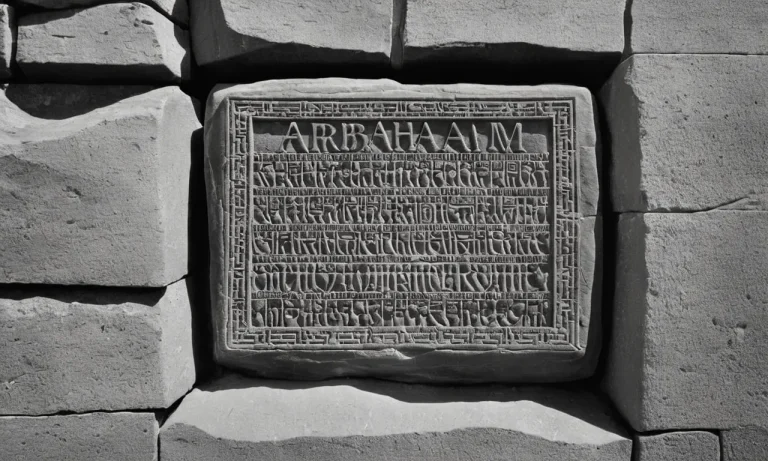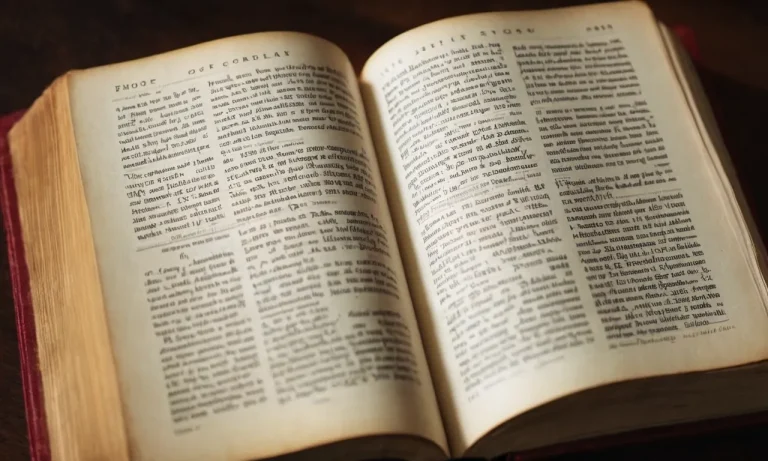How Many Times Is Peace Mentioned In The Bible?
Peace—a word that evokes tranquility, harmony, and well-being. For believers around the world, peace holds special meaning and significance. But just how often does this important concept appear in the text of the Bible?
Read on for a deep dive into the frequency of “peace” throughout both the Old and New Testaments.
If you’re short on time, here’s a quick answer to your question: The word ‘peace’ appears 429 times in the Bible across both the Old and New Testaments.
Examining ‘Peace’ in the Old Testament
The Hebrew Word for Peace: Shalom
The most common Hebrew word for peace in the Old Testament is “shalom.” It occurs over 250 times and expresses completeness, soundness, and well-being. Shalom refers to peace between people, nations, and between God and humanity.
It conveys wholeness, harmony, and flourishing in every dimension of life.
Some examples of shalom in the Old Testament include God establishing peace covenants (Numbers 25:12), prophets promising future peace (Isaiah 54:10), and people seeking God’s gift of peace (Psalm 29:11). Shalom was seen as a gift from God that required submission to his commands for its fullness.
Peace Connected to Covenants and Blessings
Peace was often associated with covenants and blessings in the Old Testament. When making covenants, God would promise peace as part of the blessings for obedience (Leviticus 26:3-6). Peace was tied to acting justly and following God’s decrees.
One example is God’s covenant with the Levites, where he promises “peace” as part of their blessing for faithfulness (Malachi 2:5-6). The Mosaic covenant also connects acting righteously with being given “peace” (Isaiah 48:18). Obedience brought harmony, while disobedience brought strife and unrest.
Peace in Prophetic Visions
Many Old Testament prophets looked forward to a time of ultimate divine peace on earth. Isaiah spoke of the “Prince of Peace” whose reign of justice and righteousness will bring endless peace (Isaiah 9:6-7).
Micah envisioned a time of universal peace between nations where “nation will not take up sword against nation” (Micah 4:3).
These prophetic visions revealed that true, lasting peace can only come through submission to God. While fullness of peace awaits the Messianic age, the prophets called people to live out peace here and now by acting justly and worshiping God alone.
The Presence of Peace in the New Testament
Jesus as the Prince of Peace
Jesus is referred to as the “Prince of Peace” in Isaiah 9:6. This title connects Jesus to the prophetic hope for an age of peace on earth. When Jesus was born, the angels proclaimed “peace on earth” (Luke 2:14), indicating that Jesus came to restore the broken relationship between God and humanity and establish peace.
Jesus embodied the peace of God during his earthly ministry. He calmed storms (Luke 8:24), healed the sick (Luke 6:19), and exorcised demons (Luke 4:35). His very presence radiated the peace of God. Jesus also taught extensively about peace, instructing his followers to love their enemies (Matthew 5:44), forgive others (Matthew 6:14), and seek reconciliation (Matthew 5:23-24).
As the Prince of Peace, Jesus came to establish peace between God and mankind. His sacrificial death on the cross made peace possible (Colossians 1:20). He then commissioned his followers to propagate this message of peace and reconciliation to the ends of the earth (Matthew 28:19-20).
Peace as a Fruit of the Spirit
The New Testament teaches that peace is a fruit of the Holy Spirit who dwells within believers in Jesus Christ. When Paul describes the fruit of the Spirit in Galatians 5:22-23, peace is mentioned as an essential attribute.
The peace that the Holy Spirit grants is not just the absence of conflict but an inner contentment and tranquility rooted in a right relationship with God. As Philippians 4:7 states, “the peace of God, which transcends all understanding, will guard your hearts and your minds in Christ Jesus.”
This supernatural peace is a promise for all who put their faith in Jesus.
Having the peace of God does not mean that believers will be free from tribulation in this life (John 16:33). But followers of Jesus have a peace that the world cannot give because it is grounded in the unshakeable love of God.
Jesus’ Teachings on Peace
In his most famous sermon, the Sermon on the Mount, Jesus began by pronouncing blessings on the peacemakers, declaring they shall be called sons of God (Matthew 5:9). This establishes peacemaking as a distinguishing characteristic of Jesus’ disciples.
Jesus modeled peacemaking through the way he treated people, forgave sins, and sacrificed himself to reconcile sinners to God. He instructed his followers to make peace through loving enemies (Luke 6:27), performing acts of service without expectation of return (Matthew 5:41), seeking reconciliation with others (Matthew 5:23-24), and spreading the gospel of peace to the nations (Matthew 28:19-20).
When Jesus sent out his twelve disciples, he told them “when you enter a house, first say, ‘Peace to this house'” (Luke 10:5). The greeting of peace was a tangible way to confer the blessing of God. Jesus’ teachings constantly connected inner peace with making peace between people.
A Statistical Overview of Peace in the Bible
Frequency Comparison Between the Old and New Testaments
Research shows that the word “peace” appears 429 times in the King James Version of the Bible. Of those mentions, 230 are found in the Old Testament and 199 in the New Testament. So while the word appears slightly more often in the Old Testament, its frequency is fairly balanced between the two main divisions of the Bible.
This near equal split highlights that peace with God and peace between people are central themes throughout the entirety of Scripture. From Genesis to Revelation, the Bible promotes tranquility, harmony, and well-being – ideals summed up in the ancient Hebrew term “shalom.”
Books of the Bible Where Peace Appears Most
The book containing the most references to peace is the Psalms, with 57 mentions. This hymn book expresses longings for inner peace, national peace, and universal peace. Other books with numerous occurrences include Isaiah (43), Jeremiah (34), Ezekiel (31), and Luke (19).
Isaiah foretells the “Prince of Peace” who will reign during a future era of righteousness and calm. Jeremiah and Ezekiel use peace to contrast times of war and exile. And the Gospel of Luke documents how Jesus brought spiritual peace between God and humanity.
Noteworthy Verses That Include Peace
Some of the most meaningful verses using the word peace include:
- “The Lord will give strength unto his people; the Lord will bless his people with peace” (Psalm 29:11).
- “Thou wilt keep him in perfect peace, whose mind is stayed on thee” (Isaiah 26:3).
- “Peace I leave with you, my peace I give unto you” (John 14:27).
- “Let the peace of God rule in your hearts” (Colossians 3:15).
These passages promise inner peace through faith in God. They encourage believers to choose peace rather than anxiety. And they exhort the promotion of peace within families, friendships, communities, and the world.
Conclusion
In summary, the concept of peace arises over 400 times throughout the pages of Scripture, underscoring its importance within the biblical narrative. Tracing its usage and connections deepens understanding of God’s desire for harmony and well-being among humanity.
While many verses touch on peace, Jesus Christ stands as the ultimate embodiment of divine peace and reconciliation. As the Prince of Peace, He alone can grant true, lasting peace in our lives today.








